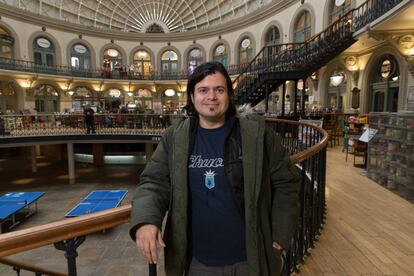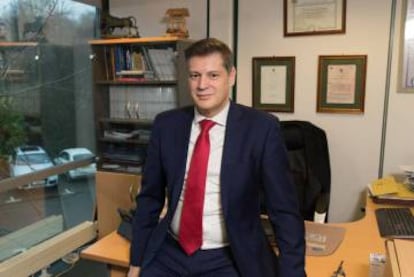Spaniards in UK fear for future as Brexit countdown begins
Faced with “bureaucratic wall” blocking permanent residency, many EU citizens are returning home

David Casarejos, a Spanish resident of the northern English city of Leeds, has just been accepted by the Spanish Consulate General in Edinburgh as a candidate to sit on its council of foreign residents (CRE) for the north of the United Kingdom. The body will discuss the implications on the Spanish community of Britain’s withdrawal from the European Union, which Prime Minister Theresa May triggers today by invoking Article 50 of the EU Treaty.

There are some three million EU nationals living in the United Kingdom, who, as of today, become part of the equation during talks over the next two years. The British governments upper chamber, the House of Lords, has called on the Conservative government to recognize their right to stay unilaterally, but it refused, backed by the lower chamber, the House of Commons.
Meanwhile, in the nine months since UK taxpayers voted to leave the EU, some of the three million Europeans living there have organized a range of groups and forums to try to represent their interests.
“Spaniards’ concerns are being channeled through groups on the internet,” says Casarejos: “These forums are producing a lot of useful information each day. From the CRE, we want to coordinate material to provide Spanish residents here with answers to their doubts.”
Now, more than ever, I need to struggle and not throw the towel in Juan Ávila, director Eville & Jones
At the same time, the Spanish Embassy has set up an email (emb.londres.brexit@maec.es), to answer queries from Spaniards about their status during Brexit talks.
For many, the only option will be to apply for permanent residence, which involves filling in an 85-page form and providing a mountain of other documents. The idea is to show that the applicant has lived for at least five years in the United Kingdom without interruption. If they have been unemployed at any time during those five years, applicants must show proof that they took out private health insurance.
Some 28% of applicants are turned down, making them immediately vulnerable to deportation, as happened with Monique Hawkins, a Dutch citizen who had lived in the United Kingdom for 24 years. In January, the European Parliament set up an initiative to look into the “bureaucratic wall” that the British government is accused of placing in the way of Europeans requesting permanent residency.
There are currently 131,335 Spaniards registered at the London and Edinburgh consulates, but estimates put the number living there at more than twice that, and Spaniards are now the eighth-largest overseas community in the United Kingdom, with a 20% increase in numbers since the global economic crisis that began in 2008. Authorities in Madrid say that more and more Spaniards are returning home, in part due to the improvement in the economy, and in part due to fears about Brexit.
Concern about immigration may have been one of the key factors driving the no vote in the June 2016 referendum on EU membership, but as David Davis, secretary of state for exiting the European Union, admitted earlier this month, the number of foreigners working in Britain will not necessarily fall in coming years, given that there are industries “that depend on immigrants.”

Juan Ávila, who was born and brought up in Cordoba and has lived in Leeds since 1991, knows this all too well. He runs a veterinary company that certifies meat from UK abattoirs. “There are 500 employees in my company: just two are British, and there are 180 Spaniards,” he explains. “So you could say that a third of the meat produced in the United Kingdom is approved and certified by Spanish vets.”
Ávila has been recruited to form part of a working group to look into the impact of Brexit on his sector. The first conclusion he has drawn in a document sent to the British government is that without European vets, “the sector would collapse.” There are similar concerns in other sectors, such as the national health service, where more than 130,000 EU health professionals are employed.
Many EU citizens will leave the UK in the coming months. But others, such as Juan Ávila, say they are staying. “We are very worried, but I am not considering going back,” he insists. “Now, more than ever, I need to struggle and not throw in the towel. We have to show that Brexit has been a huge mistake.”
English version by Nick Lyne.
Tu suscripción se está usando en otro dispositivo
¿Quieres añadir otro usuario a tu suscripción?
Si continúas leyendo en este dispositivo, no se podrá leer en el otro.
FlechaTu suscripción se está usando en otro dispositivo y solo puedes acceder a EL PAÍS desde un dispositivo a la vez.
Si quieres compartir tu cuenta, cambia tu suscripción a la modalidad Premium, así podrás añadir otro usuario. Cada uno accederá con su propia cuenta de email, lo que os permitirá personalizar vuestra experiencia en EL PAÍS.
¿Tienes una suscripción de empresa? Accede aquí para contratar más cuentas.
En el caso de no saber quién está usando tu cuenta, te recomendamos cambiar tu contraseña aquí.
Si decides continuar compartiendo tu cuenta, este mensaje se mostrará en tu dispositivo y en el de la otra persona que está usando tu cuenta de forma indefinida, afectando a tu experiencia de lectura. Puedes consultar aquí los términos y condiciones de la suscripción digital.








































